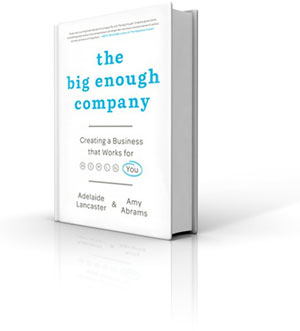I know what you might be saying to yourselves, “What? Are you crazy? Not grow my business? Isn’t that the point? How else will I be successful?” I hear your concern. Before you dismiss the choice not to grow, take a minute to think about your goals and the impact of growth.
As a culture, we have a real addiction to size. We believe that bigger is better. Period. Even in the business world, we impress each other by talking about numbers of employees, sales, market share and locations. From the second that most entrepreneurs start their business, they are encouraged to start thinking about just how big this venture can be – often even before the concept is proven, vetted, or even fleshed out.
As soon as entrepreneurs open their doors they immediately start fielding questions about growth. “When will you expand? How many locations will you open? Are you going to hire people to see more clients?” As consumers and small business enthusiasts we, intrigued by fast-growing empires and the myth of the overnight success, egg the process on. “Yes, open a store in my city!” “You should hire more staff so you can see more people”, we chip in. “You should get your brand in Bloomingdale’s or Whole Foods.”
Several Good Reasons Not To Grow
On the other hand, there are a whole lot of entrepreneurs who believe that success isn’t about size; it’s about satisfaction. And sometimes that satisfaction isn’t congruent with growth or at least the traditional growth plans of replication or building a super-sized version of your business. Many entrepreneurs have found good reasons to reject a ‘growth for growth’s sake’ strategy. Let’s look at 5 of the most common.
1. Becoming a square peg. Growth may take you out of the role that you most enjoy. Let’s say you love the service aspect of your business or want to maximize the time you spend designing/writing/speaking/teaching/selling/creating/ or innovating. Building a bigger machine may require you to sacrifice too much of you your desired job in order to focus on the on business building tasks.
2. Income plateau. Many entrepreneurs are surprised that bigger versions of their business don’t necessarily yield bigger incomes. But increased revenues are almost always accompanied by increased expenses. Some entrepreneurs decide that the net gain doesn’t justify the sacrifices required.
3. Unsustainable lifestyle. More moving pieces inevitably mean more to pay attention to and more responsibility. A business goal for lots of entrepreneurs is longevity. They want to enjoy running their business in 10 years. This kind of long-term sustainability can be undermined by growing too fast or too soon. Burnout is a real risk in entrepreneurship and stamina is a valuable asset.
4. Undermines Business Purpose. To the surprise of some, having as many customers as possible isn’t the goal for every business. For some businesses a high-touch experience is what it’s all about. Others go for depth rather than breadth. Growth can force businesses to compromise on their core purpose, altering what they are known for and moving away from what the entrepreneur cares about.
5. Limits range of activities. More and more entrepreneurs are building their businesses by creating a portfolio of various activities and diversifying their revenue streams. For example a consultant who loves speaking, creating products, consulting, and writing or a product company that wants to retail, wholesale, license, consult, and speak. Growing or scaling one aspect of their business would preclude them from pursuing other activities and outlets.
None of this is to suggest that I am anti-growth or anti-big-“small business”, quite the opposite. I want to help entrepreneurs to pursue the best end for them, whatever that may be. I don’t believe in growth for growth’s sake but I do believe in growing for the right reasons.
So as you consider your own venture’s future don’t blindly put size before everything else. Instead define success by your own satisfaction, carefully considering your goals, business purpose, role, motivations, and desired outcomes. It is these elements that will help you decide the size that right for you.
Connect with Adelaide on Twitter. Did you enjoy this article? If so, subscribe to YFS Magazine and never miss an update. Don’t forget to make our friendship official and join Young, Fabulous & Self-Employed entrepreneurs on Facebook.
© YFS Magazine. All Rights Reserved. Copying prohibited. All material is protected by U.S. and international copyright laws. Unauthorized reproduction or distribution of this material is prohibited. Sharing of this material under Attribution-NonCommercial-NoDerivatives 4.0 International terms, listed here, is permitted.





